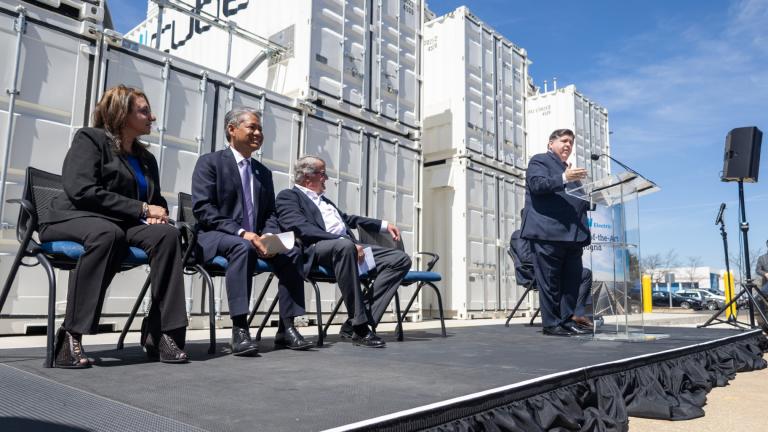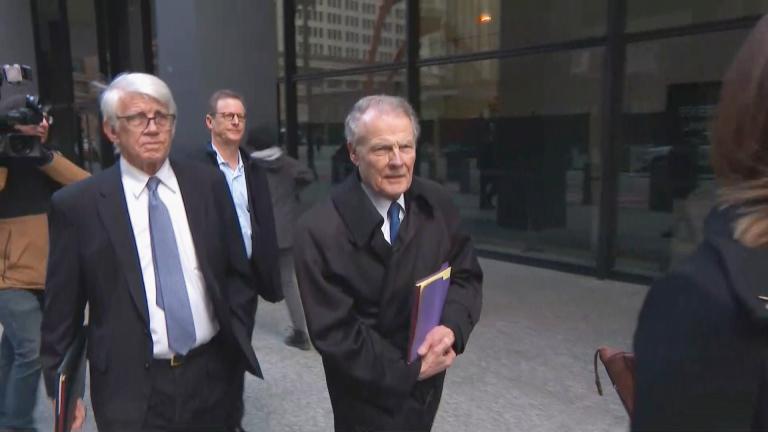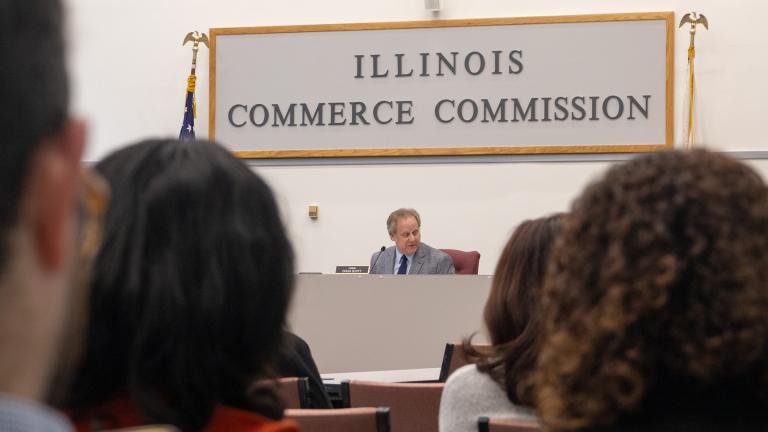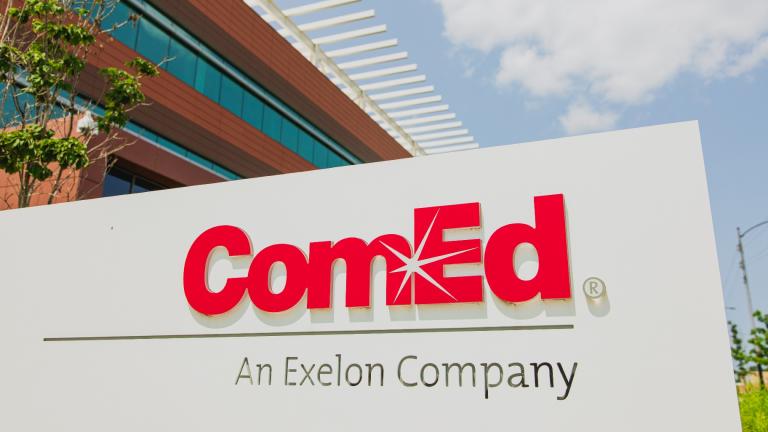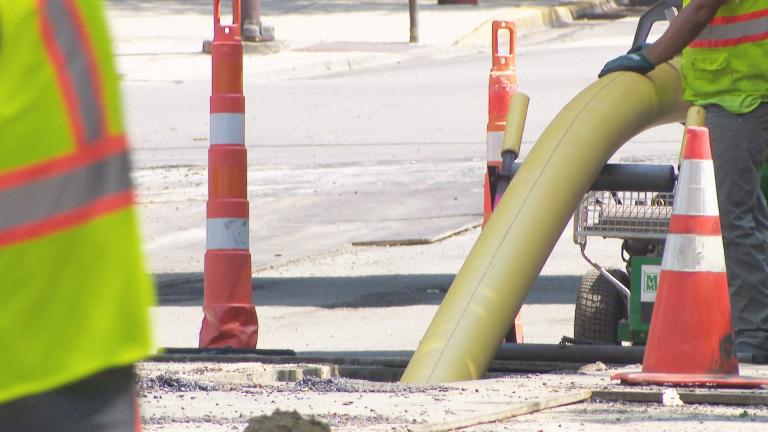Mayor Lori Lightfoot urged members of the Chicago City Council on Monday to extend Commonwealth Edison’s lucrative contract for 15 years in return for at least $100 million from the beleaguered utility giant to be used in the city’s fight against climate change.
In a series of briefings with City Council members, top aides to Lightfoot touted the agreement as a way to make sure the lights stay on in homes and businesses across Chicago while funding the city’s transition to clean energy, according to documents obtained by WTTW News.
A spokesperson for Lightfoot declined to comment on the specifics of the agreement, which could be introduced to the City Council on Wednesday. That could mean a final vote by the City Council could come on March 1 – one day after Lightfoot and alderpeople ask voters for new four-year terms in office.
However, several alderpeople said they were surprised by the news of the agreement, and skeptical that the deal needed to be ratified during an election nearly 800 days after it expired.
“This is a huge issue to drop four weeks before an election,” said Ald. Matt Martin, whose bid for another term representing the North Side’s 47th Ward is unopposed.
The presentation to alderpeople included promises of at least $520 million for “hundreds of energy & equity community benefit projects to advance the 2022 Climate Action Plan,” which promises to reduce carbon emissions in Chicago by 62% by 2040.
At least $100 million to fund those programs will come directly from ComEd shareholders, alderpeople were told, to be administered by a new nonprofit organization to be run by officials appointed by the mayor and confirmed by the City Council, alongside representatives of ComEd.
“That’s a real red flag,” Martin said, asking why a new nonprofit organization should be created to administer funds designed to benefit Chicagoans. “The city should make those decisions.”
The agreement also calls for thousands of new rooftop solar panels, as well as broadband internet access for Chicago residents through ComEd’s fiber network.
In addition, ComEd has agreed to fund a new training facility on the city’s West Side to train 10,000 Chicagoans to work in the clean energy industry and hire an additional 1,000 South and West side residents to work for the company in construction and customer service jobs.
“Productive discussions have continued between the city and ComEd to arrive at an agreement that will meet the mayor’s goal to support reliable and equitable transition to a clean energy future for all of Chicago’s communities,” Lightfoot press secretary Cesar Rodriguez said in a statement.
Representatives of ComEd also declined to comment on the specifics of the agreement that would replace the deal, inked in 1992, that expired in December 2020.
“ComEd remains closely engaged with the City of Chicago to arrive at an agreement that will expand on our century-long partnership to support and spur a reliable and equitable transition to a clean energy future for all of Chicago’s communities,” ComEd spokeswoman Shannon Breymaier said in a statement to WTTW News.
Earlier this month, ComEd officials asked state officials to allow it to hike rates by approximately $1.5 billion during the next four years. The average ratepayer would see their monthly bill increase by $17 for the delivery of electricity by 2027, if the rate hike is approved, according to ComEd.
The proposed agreement with the city of Chicago calls for more than 100 “energy assistance ambassadors” to help people get help paying their bills and avoid shutoffs.
The news of the agreement between Lightfoot and ComEd officials was first reported by Crain's Chicago Business just hours before a report compiled by the Energy and Policy Institute, the Center for Biological Diversity and BailoutWatch revealed that ComEd canceled service for 225,827 accounts through October 2022, an increase of 27% from the same 10 months in the prior year.
The proposed pact would allow the city to end the agreement in five years in order to form its own electric utility. However, a study released in August 2020 found it would cost the city $9 billion to “municipalize” ComEd, thwarting efforts by the Chicago chapter of the Democratic Socialists of America designed to cut the city’s ties with ComEd.
Martin said that provision had “no teeth,” because of the eyepopping price tag of municipalization.
Negotiations over new agreement with ComEd was also complicated by the utility giant’s admission in July 2020 that firm officials arranged jobs, contracts and payoffs to associates of former House Speaker Michael Madigan in return for the powerful lawmaker’s support for laws that allowed ComEd to hike electricity rates. The firm agreed to pay a $200 million fine to resolve federal corruption charges.
Madigan has pleaded not guilty to nearly two dozen criminal charges. He is set to stand trial in April 2024.
The utility giant's admission prompted Lightfoot to halt negotiations designed to result in a new franchise agreement and demand the firm agree to implement “a comprehensive ethics reform plan that rebuilds trust with the city, its residents and its businesses” in addition to programs designed to reduce climate change.
It is not clear what, if any, ethics reforms were included in the deal negotiated by Lightfoot.
Lightfoot also lit up ComEd with criticism after the utility giant began to disconnect customers for nonpayment even as the COVID-19 pandemic raged. The mayor also demanded that ComEd, and its parent company Exelon, agree to address “economic hardship across Chicago” in any new franchise agreement.
Exelon executive Anne Prammagiore, former ComEd government relations vice president and later lobbyist John Hooker, former City Club of Chicago president Jay Doherty and former Madigan aide Michael McClain are scheduled to stand trial on March 6 for their role in the scheme that arranged jobs, contracts and payoffs for the former speaker’s associates to win his crucial support. All have pleaded not guilty.
Martin said he questioned the wisdom of inking a new deal with ComEd before the resolution of that trial, which could reveal new information about the scheme that upended Illinois politics.
“Should we be partnering with them?” Martin asked. “That’s the fundamental question.”
Contact Heather Cherone: @HeatherCherone | (773) 569-1863 | [email protected]

